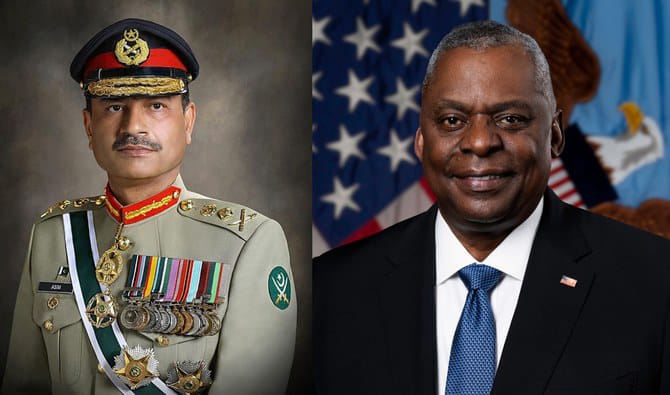In a significant diplomatic exchange, the Chief of Army Staff for Pakistan, General Asim Munir, engaged in a telephone conversation with the United States Secretary of Defence, Lloyd Austin. The conversation, as reported by the US Department of Defence, primarily revolved around “areas of mutual interest as well as recent regional developments.” While specific details of the discussion remain undisclosed, this dialogue holds crucial implications for both nations and the broader regional landscape.
Telephone Discussion Addresses Growing Concerns Over Terrorism in Pakistan
As terrorism continues to pose a substantial threat in Pakistan, the conversation between General Asim Munir and Secretary Lloyd Austin assumes heightened importance. Recent incidents of terror activities in Pakistan, particularly in the Khyber Pakhtunkhwa (KP) and Balochistan regions, have raised alarm bells. Notably, the Tehreek-i-Taliban Pakistan (TTP) ended its ceasefire with the government in November last year, exacerbating security challenges.
On September 6, a military operation in the Chitral district resulted in the martyrdom of four security personnel and the elimination of over 16 militants. A report from the Pakistan Institute for Conflict and Security Studies, released in July, underscored a concerning trend of increasing terror and suicide attacks in the first half of the year, claiming the lives of 389 people across the country.
US Offers Collaborative Efforts to Counter Violent Extremism
In a notable development, the US State Department Spokesperson, Matthew Miller, expressed the willingness of the United States to collaborate with Pakistan on strategies aimed at countering all forms of violent extremism. Miller’s statement, made on Monday, underscores the United States’ commitment to supporting Pakistan’s efforts in combatting the pervasive threat of terrorism.
“We will continue to work with Pakistan to ensure that we can better assist Pakistan’s efforts to counter all forms of violent extremism,” stated Miller, highlighting the importance of international cooperation in addressing this global challenge. This collaborative approach may signify a step towards stronger bilateral ties between the two nations in their shared pursuit of regional stability and security.
US Special Representative Highlights Pakistan’s Role in Regional Stability
Further emphasizing Pakistan’s role in regional stability, the US Special Representative for Afghanistan, Tom West, identified the banned Tehreek-i-Taliban Pakistan (TTP) as the greatest threat to the overall stability of the region. When questioned about Pakistan’s contribution to achieving US goals in Afghanistan, West spoke positively, acknowledging Pakistan as a valuable partner.
“I would say on balance they are a help,” West asserted. He praised Pakistan’s contributions to security, trouble-shooting in relocation-related issues, and assistance with refugee processing. This assessment positions Pakistan as an instrumental player in regional security efforts, fostering the potential for deeper cooperation between Pakistan and the United States.
In conclusion, the telephone conversation between General Asim Munir and Secretary Lloyd Austin marks a pivotal moment in the diplomatic relations between Pakistan and the United States. Amidst growing concerns over terrorism in Pakistan, the commitment to collaborate on countering violent extremism reflects a shared vision for regional stability. The words of US Special Representative Tom West underline the significance of Pakistan’s role in achieving peace and security in the region, potentially paving the way for strengthened ties and coordinated efforts between the two nations.















